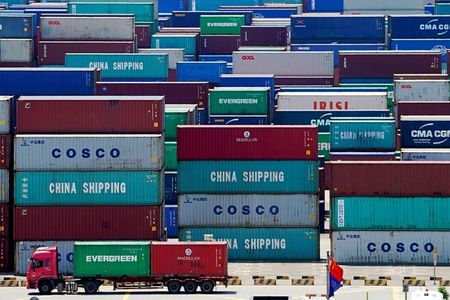BEIJING (Reuters) -China’s exports growth lost steam in November, pressured by a strong yuan, weakening demand and higher costs, but imports unexpectedly accelerated as the country scrambled to restock depleted commodities like coal.
Exports rose 22% year-on-year in November, customs data showed on Tuesday, slower than the 27.1% jump in the previous month but faster than the 19.0% expected in a Reuters poll.
Imports climbed 31.7%, beating the 19.8% rise in October and well above the forecast 20.6% gain.
China’s coal imports in November hit their highest level in 2021, as the world’s biggest consumer of the dirty fuel scrambled during the onset of winter to feed its power system, which had been experiencing shortages.
The easing of the power crunch also helped increase demand for copper. Imports of the key industrial metal hit their highest levels since March.
“Coal imports in particular soared. I think this reflects the policy change in China to solve the energy shortage problem, which constrained growth in Q3,” said Zhiwei Zhang, chief economist at Pinpoint Asset Management. “I don’t think there is a significant improvement of domestic demand yet.”
China’s trade surplus was $71.72 billion last month, narrower than the poll’s forecast for $82.75 billion and the $84.54 billion surplus in October.
The data comes a day after China’s central bank announced a cut to the amount of cash that banks must hold in reserve, its second such move this year, to bolster slowing economic growth.
The country has staged an impressive rebound from the pandemic but there are signs momentum is flagging. Power shortages, regulatory crackdowns on major industries and debt troubles in the property sector are weighing on China’s recovery.
Analysts expect more supportive policy measures in the coming months.
A private sector survey showed factory activity fell in November, hit by higher prices and subdued demand although the government’s official survey showed activity grew in the month.
China’s factory-gate inflation hit a 26-year high in October as coal prices soared during the power crunch.
No cases of the Omicron COVID-19 variant have been reported in China to date, but its emergence could add pressure to the strict zero-tolerance policy on coronavirus cases and increase logistical challenges for exporters, analysts say.
But Omicron could also support China’s exporters in the near-term by keeping consumers abroad buying goods, rather than services, amid increased social distancing, said Julian Evans-Pritchard, senior China economist at Capital Economics, in a note.
“That said, the scope for a further rise in outbound shipments is limited – container throughput has levelled off in the past 12 months as ports have been operating close to capacity,” he added.
China reported 94 new confirmed coronavirus cases for Dec. 6, with locally transmitted infections in Inner Mongolia, Heilongjiang, Yunnan and Zhejiang.
(Reporting by Gabriel Crossley and Albee Zhang; Editing by Sam Holmes)









